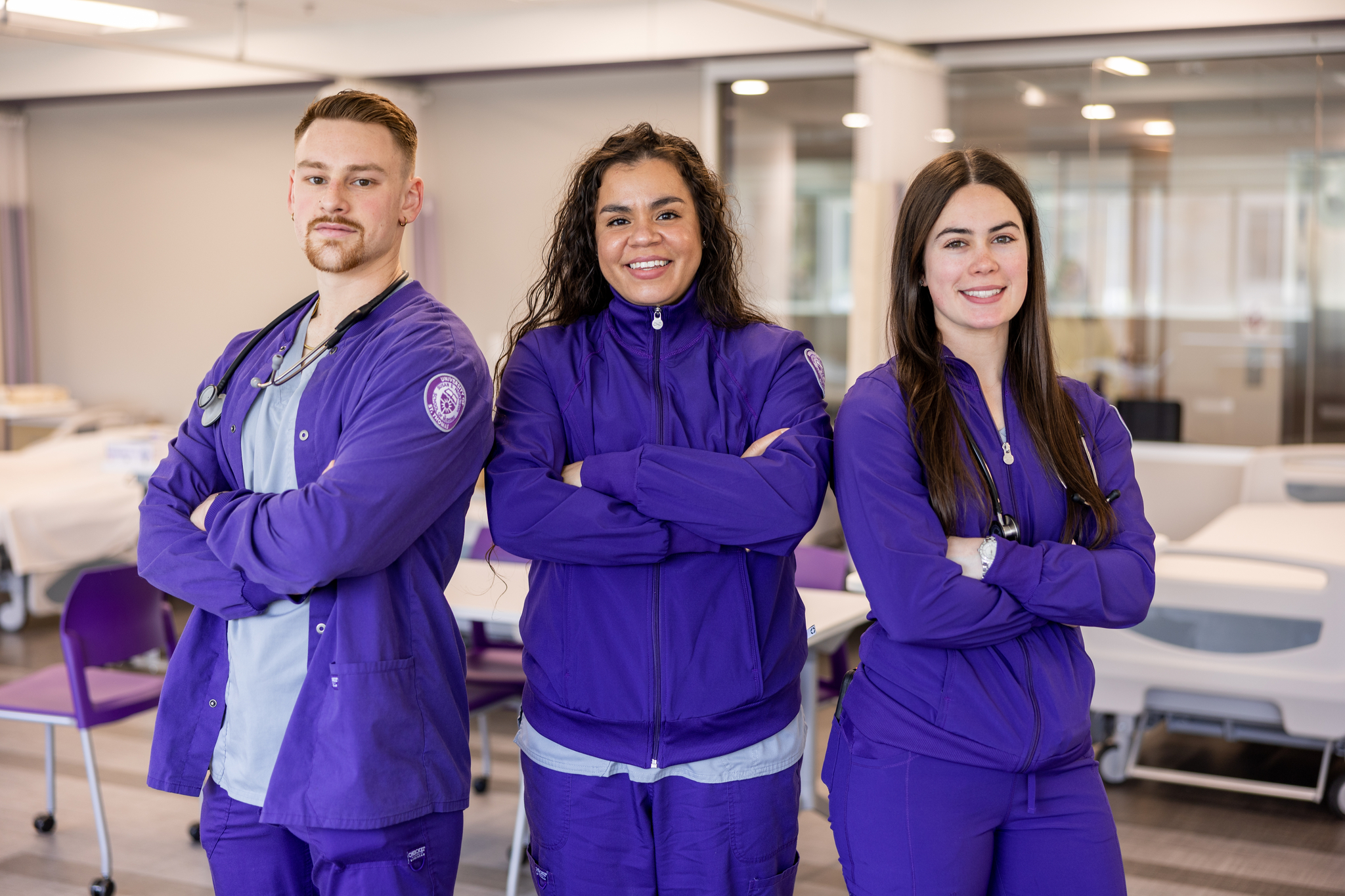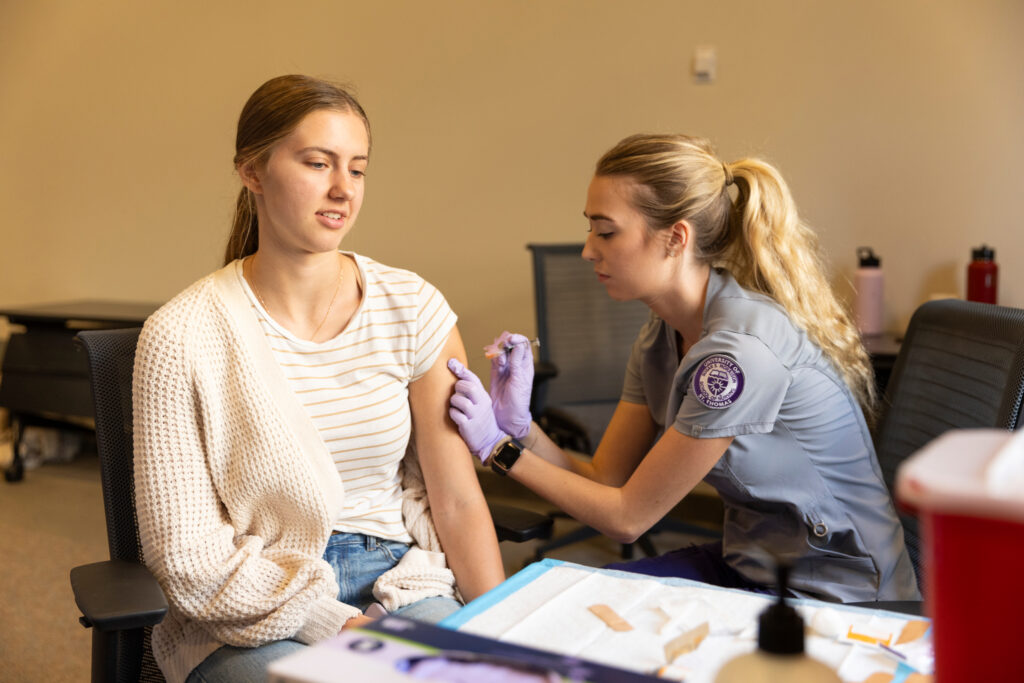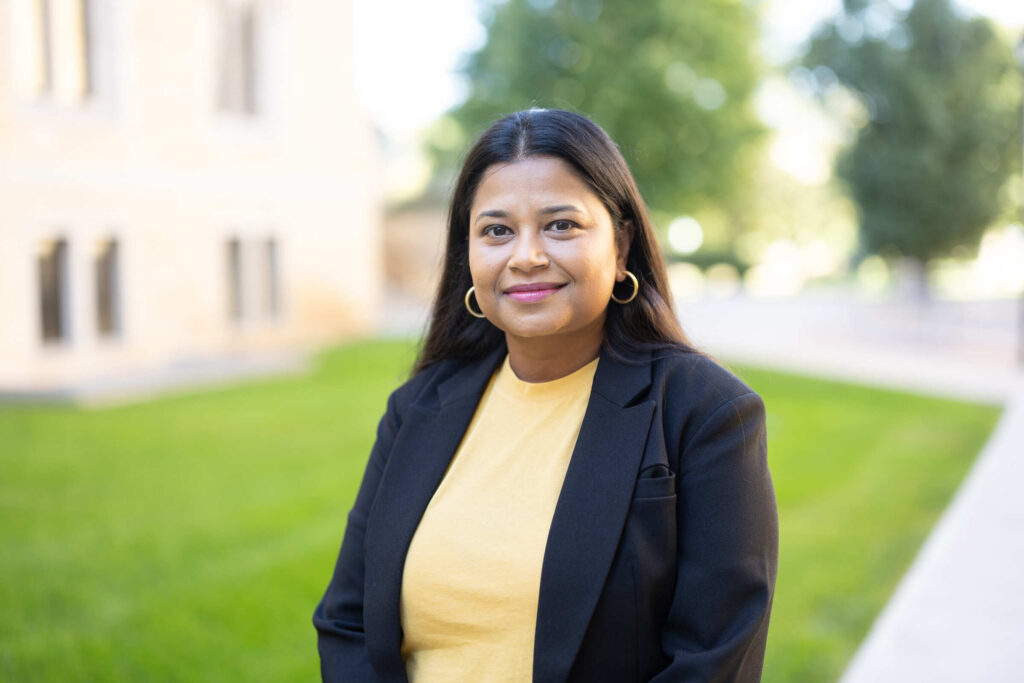After years working in hotel management, Nuela Cannady ’24 MSN was looking for a career change that would make an impact. The native New Yorker found her path forward through a master’s degree from the Susan S. Morrison School of Nursing at the University of St. Thomas in Minnesota.
Cannady is one of 37 Masters of Nursing candidates who will receive their diplomas this spring. They’ll each walk across the graduation stage having completed 570 clinical hours, 56 course credits and countless hours in the school’s high-tech Center for Simulation.
The commencement is as much a milestone for them as it is for the school. When the School of Nursing opened its doors in 2022, it did so with a laser-sharp objective: to educate a new generation of health care professionals committed to advancing health equity, social justice and whole-person health. Two years later, that strategy is beginning to pay off with its first graduating class.
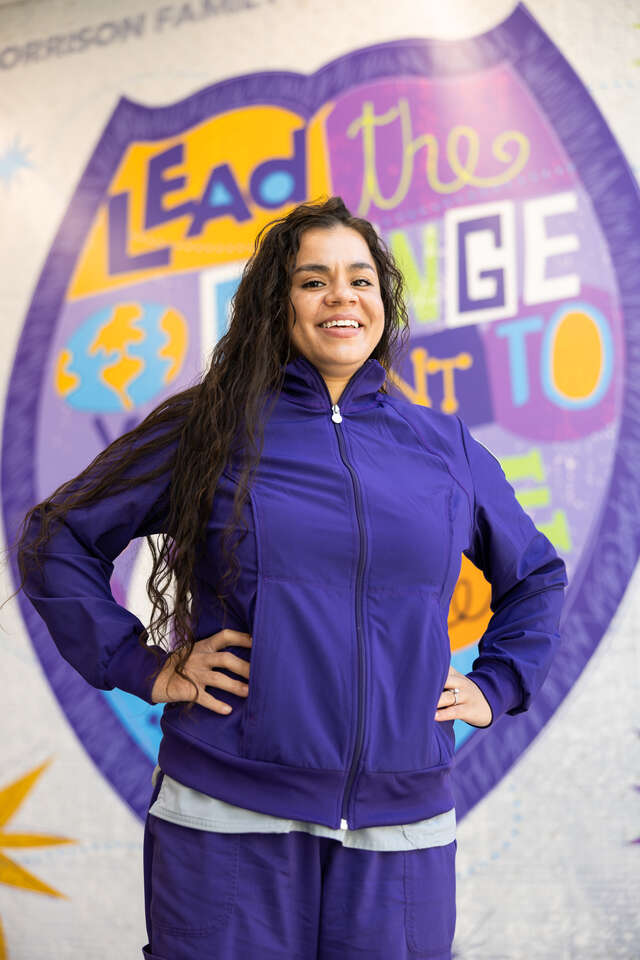
“I’ve always had a passion for serving people and helping people,” Cannady said. “But I wanted to do more and use my skills to help those who really needed somebody to advocate for them.”
As a child, Cannady moved with her family from New York to Minneapolis, Minnesota. One of the biggest challenges for her Mexican mother and Puerto Rican father was navigating the local health care system. Cannady didn’t always know how or why, but she felt that her family was being treated differently.
“I started to ask a lot of questions,” Cannady said. “And I think those experiences I witnessed when I was younger are propelling me now to stand up for those that don’t always have a voice.”
The School of Nursing’s Master of Science in Nursing (MSN) program is designed for non-nurses (those with a bachelor’s degree in something other than nursing) who wish to change careers and pursue the nursing profession. The St. Thomas four-year Bachelor of Science in Nursing (BSN) program will graduate its first class in 2026.
For Cannady, who already holds a bachelor’s degree in nutrition and business administration, the entry into nursing with a master’s program was the right choice. Drawn in by its 20-month timeline, she connected deeply with the school’s mission to train culturally-responsive professionals.
“I want to help build trust in our system and be that person that can help change those experiences into positive ones,” Cannady said.
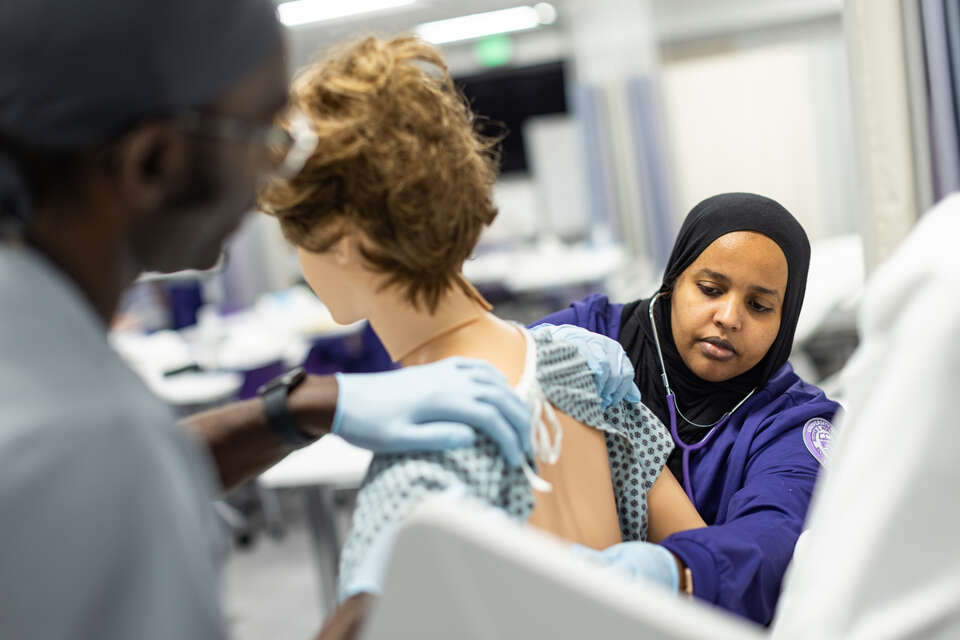
Creating change at a critical time
Minnesota’s newest nurses will enter the workforce at a crucial moment: A severe nursing shortage continues to grow across the nation. The U.S. Bureau of Labor Statistics projects that more than 275,000 additional nurses are needed through 2030 to meet the demand of the aging baby boomers and keep pace with the number of retiring nurses.
Meanwhile, health care disparities persist among those who have low income, those of certain racial and ethnic groups, and those in rural areas due to lack of transportation to health care providers, quality of centers and other factors directly related to the historical and current unequal distribution of socioeconomic and political power in the country.
Dr. MayKao Hang, vice president, strategic initiatives and founding dean of the Morrison Family College of Health, built the School of Nursing with the current health care crisis top of mind.
“We designed this program to focus on health equity, social justice and increasing access to care,” Hang said. “But education is only the foundation, and the true work begins when you hit the real world. I’m confident these students are ready to create change and advance our mission in their own communities.”
Students graduating with an MSN will enter the high-demand field prepared to provide care in a variety of settings, from clinic and hospital work to birthing centers and schools. At the same time, the program is also preparing students to transition to some practice roles in nursing leadership.
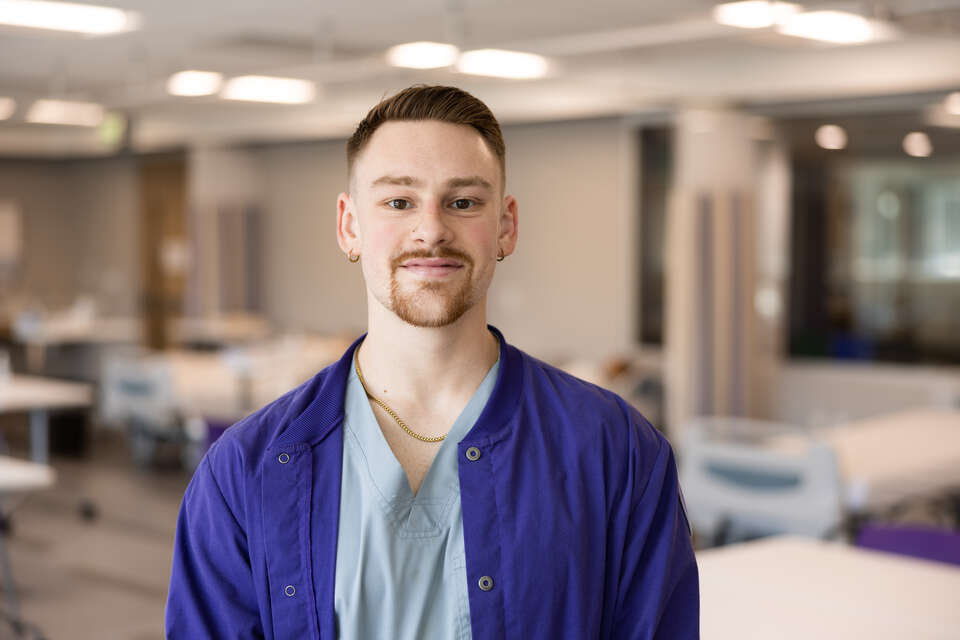
That leadership component attracted Roy Palmer ’24 MSN to the program, who plans to pursue a career in public health leadership after graduation.
“I really liked what St. Thomas was doing in terms of their program being centered around advancing equity,” Palmer said. “I hope to find myself in a position where I can work from the top down and try to change things on a large scale.”
Palmer graduated from St. Thomas in 2020 with bachelor’s degrees in exercise science and psychology, and quickly found work as a sports performance coach at Twin Cities Orthopedics.
“I was working with high-level athletes, and I loved it. But I really wanted to be able to help anyone and everyone, not just this select population,” Palmer said. “I felt I could be making a bigger impact using some of those same skills as a nurse.”
Learning to create change through advocacy and leadership is a keystone element of the School of Nursing. Students are encouraged to become changemakers the moment they step onto campus, proactively considering ways they can improve quality and safety in nursing practice and health care systems.
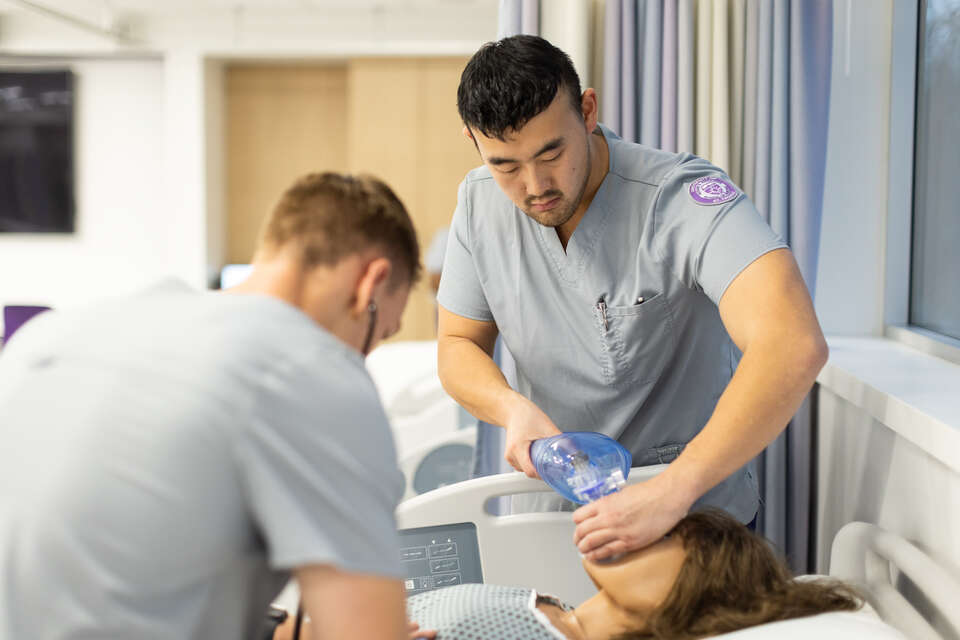
Both Palmer and Cannady volunteered at this year’s Midwest Nursing Research Society Conference in Minneapolis. Dr. Annette Hines, executive director of the School of Nursing, was not surprised to see her students in attendance, sharing ideas and learning from other professionals.
“Our students have shown through their actions that they are willing to go above and beyond what’s required of them to graduate – instead they are embracing their role in the nursing community as true agents of change,” Hines said.
Transitioning to the workforce
The Class of 2024 itself will help close health equity gaps in the profession. Leaders were careful to recruit students with a wide range of life experiences and who mirror vibrant communities across the Midwest. Studies show that when nurses reflect the patient demographic, outcomes improve.
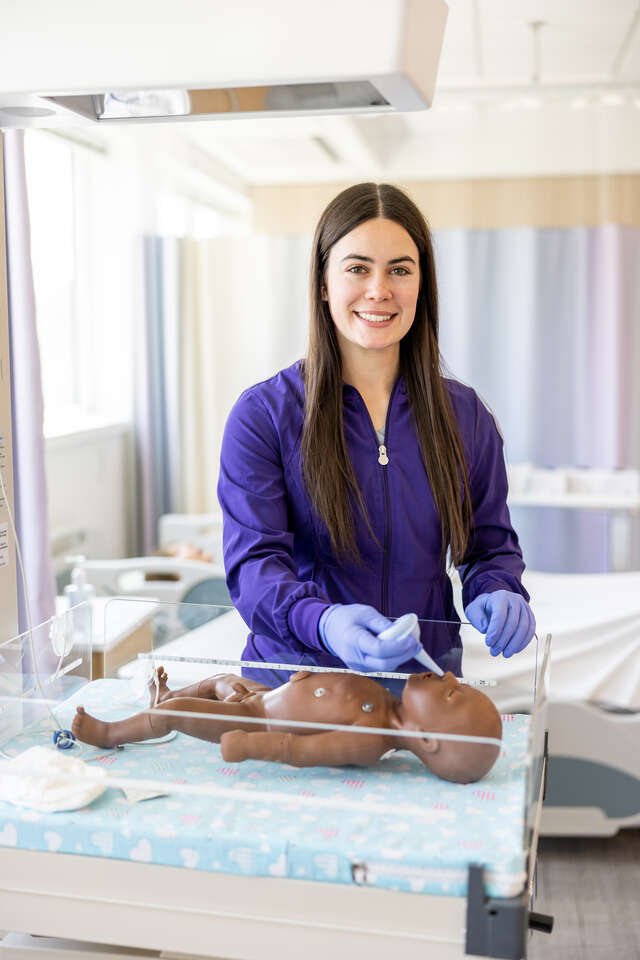
Young men, African Americans and people who are Latinx are greatly underrepresented as registered nurses (RNs) when compared to the general population. In addition to considering gender and race, School of Nursing also worked to enroll a significant number of students who were first-generation and from rural communities.
Emily Pieper ’24 MSN, an EMT from Hugo, Minnesota, is passionate about rural health care and improving access for rural and Native communities. After graduating with the inaugural MSN class, she hopes to work as a flight nurse or eventually open her own practice.
“Things like mental health conditions, substance abuse and trauma, the disparities in those areas are really high in rural communities and I hope to contribute meaningfully to reducing those numbers,” Pieper said.
Pursuing an MSN while working full time as an EMT has created a very packed schedule. In addition to her position at a clinic in West St. Paul, Pieper is completing her capstone clinical rotation in the critical care float pool at Abbott Northwestern Hospital in Minneapolis.
“It’s been hard being this busy, but I’ve always had good time management,” Pieper said. “Pursuing my master’s while working full time has allowed me to develop a better depth of knowledge. I hope to carry that forward in my career.”
After a special pinning ceremony and walking across the commencement stage, the next challenge for these aspiring nurses is to sit for the National Council of State Boards of Nursing NCLEX-RN licensure exam. The School of Nursing will be watching their results closely and offering support services as they transition to the workforce.

For Dean Hang, who envisioned this first graduating class more than five years ago, it’s a moment worthy of celebration.
“These MSN students know what they want to become: They want to become nurses … but also leaders in our industry,” Hang said. “They are ready to go forward and do great things, and I think all of health care will be better for it.”
